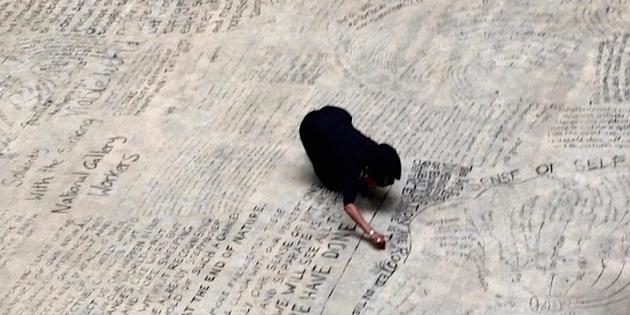Saturday 13 June, Tate Modern has been taken over by protesters from Liberate Tate an organisation committed to ending the relationship between Tate and the oil giant BP. Over 70 artists have invaded the Turbine Hall for an unauthorised performance in the Tate Modern’s Turbine Hall, Members of the art collective have titled the performance ‘Time Piece’, it is expected to last 25 hours ending tomorrow afternoon.
The protest has filled the gallery with scrawled black graffiti engaging “ideas and narratives of art, activism, climate change and oil”. The activists who are all dressed in black are simulating a full tide cycle by moving across the 152-metre sloping floor and writing warning sentences about climate change.
Yasmin De Silva of Liberate Tate said, “Oil companies, like BP, are trying to carry on pretending its business as usual, but time is running out to act on climate change. We’re already seeing the impact of climate change globally, and companies, foundations and institutions around the world are turning away from the fossil fuel industry that’s driving us to climate disaster. “We’re here today to let Tate know the tide is rising against its continued support for BP, which has a shocking history of environmental disasters, human rights abuses and lobbying against climate change legislation.”
The words were sourced from a range of books and reports, including Margaret Atwood’s dystopian novel Oryx and Crake, the UN’s latest climate science reportand Naomi Klein’s This Changes Everything: Capitalism vs the Climate.
Other past protest have included a nude person being soaked in oil at Tate Britain, with quotes from the court case against BP’s Gulf of Mexico oil spill read out in the galleries. They also staged an exorcism of the “evil spirit of BP”,one of 14 events so far.
The museum closes at 10pm and Tate’s security team is on high alert with social networks in full operation to cover the action.
When the Tate director Sir Nicholas Serota began his tenure in 1988 he wanted to address the fact that only about one-fifth of Tate Gallery’s art could be seen at any one time. A new annual re-hang of the permanent collection was put in place allowing more curatorial freedom and, importantly, the marketing benefits of a temporary exhibition. British Petroleum (now BP) was secured as a sponsor in 1990 for the initiative, called ‘New Displays’, with the oil company’s logo appearing on the banners outside the building, gallery walls, publications and advertising.
Whilst the present financial value of BP sponsorship is kept secret, when the national collection held by Tate was reorganised in 1990 the cost was reported as £400,000 with three quarters (£300,000) provided by BP as part of a initial package of £150, 000 payments a year (the equivalent of five 30-second TV ads back then and about twice that in equivalent pounds today).
Since 1990 ethical concerns about forms of arts sponsorship have risen dramatically. Tobacco companies, like arms companies before them, became unacceptable partners for public institutions. For example, the current BP Portrait Award at the National Portrait Gallery was previously sponsored by Imperial Tobacco. Then oil sponsorship of the arts became the biggest area of public and artist concern due to the negative impacts of BP and Shell on human rights, the environment and the global climate. Decades of scientific evidence of climate change due to burning hydrocarbons and the negative social and environmental impacts of oil companies is now clear and far more widely known amongst the public.

